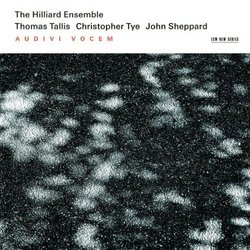| All Artists: Thomas Tallis, Christopher Tye, John Sheppard, Hilliard Ensemble, David James, Rogers Covey-Crump, Steven Harrold, Gordon Jones, Robert MacDonald Title: Audivi Vocem Members Wishing: 3 Total Copies: 0 Label: ECM Records Original Release Date: 1/1/2008 Re-Release Date: 6/24/2008 Genres: Special Interest, Pop, Classical Styles: Vocal Pop, Opera & Classical Vocal, Chamber Music, Historical Periods, Classical (c.1770-1830) Number of Discs: 1 SwapaCD Credits: 1 UPC: 028947663539 |
Search - Thomas Tallis, Christopher Tye, John Sheppard :: Audivi Vocem
 | Thomas Tallis, Christopher Tye, John Sheppard Audivi Vocem Genres: Special Interest, Pop, Classical
CD-package includes 28-page booklet with an introduction by David Skinner in English and German and all sung texts. "If clarity is a virtue, these people are saints", wrote France's Nouvel Oberservateur about the Hilliard ... more » |
Larger Image |
CD Details
Synopsis
Album Description
CD-package includes 28-page booklet with an introduction by David Skinner in English and German and all sung texts. "If clarity is a virtue, these people are saints", wrote France's Nouvel Oberservateur about the Hilliard Ensemble when their interpretation of Bach's motets was released in spring 2007. "Never have these shining works sounded more beautiful" commented Die Zeit while the Guardian observed a "supremely musical" rendering, "overflowing with food for thought". Last November the ensemble received a certificate of honor for their artistic achievements by the jury of Preis der Deutschen Schallplattenkritik, the Prize of German Record Critics. As commonly known, the Hilliard Ensemble's repertoire ranges from Perotin to Erkki-Sven Tüür, from Guillaume de Machaut to German composer Heiner Goebbels whose new music theatre project, due for first performance in Lausanne this summer, will feature the four singers. British music however marks a relatively small component of their programs. For the first time after the much-acclaimed Tallis-record The Lamentations of Jeremiah the present production offers an opportunity to listen to performances of music from the precious English a cappella repertoire. Thomas Tallis (c. 1505 - 1585), Christopher Tye (c. 1505 - c. 1575) and John Sheppard (c. 1515 - 1558) were active during a period when Britain swung violently between Catholicism and Protestantism. While Henry VIII, who broke ties with Rome, remained Catholic in liturgical taste, his successor, Edward VI introduced a puritanical Protestant regime, to considerable effect on church music. Queen Mary, on the other hand, restored a fervent Catholicism, and only when Elizabeth mounted the throne in 1558, a moderately Protestant compromise was reached. Composers thus had to constantly adapt to the liturgical changes, and all three featuring on this CD both profited from the ensuing musical developments and shaped them themselves. In his liner notes, David Skinner - he prepared the scores and offered academic advice for this program - points out: "The Reformation, it transpires, was a very good thing for music: it forced composers to explore a variety of compositional techniques, and, most importantly, how better to set a text. It was these skills, developed, tried and tested by the likes of Tye, Sheppard and Tallis that set the foundation for the next generation of composers." Like on most of the previous Hilliard Ensemble albums, the program is carefully assembled: Tye's "Missa Sine Nomine" serves as the backbone for a suite of responds, antiphones and anthems by the three English composers.

 Track Listings (14) - Disc #1
Track Listings (14) - Disc #1